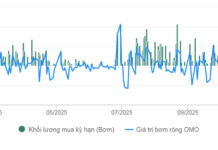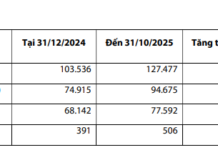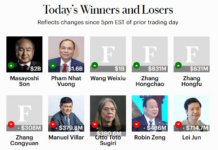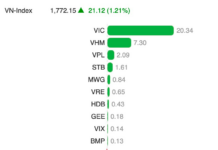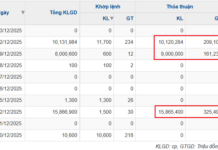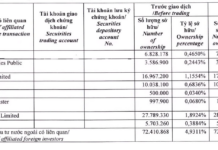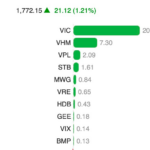Nostalgia for a Bygone Era: Miliket and Thorakao’s Resilience in the Face of Change
In the 1980s and 1990s, when it came to instant noodles, Miliket with its iconic twin shrimp logo was the first brand that came to mind for most consumers. Owned by Colusa-Miliket, a well-established company founded in Ho Chi Minh City’s Thu Duc City, a pack of Miliket noodles used to be considered a delicacy, commanding a premium price ranging from 500 to 1,500 Vietnamese dong. As the economy improved in the 1990s, Miliket became a household staple, with the brand capturing up to 90% of the instant noodle market share in Vietnam at its peak.
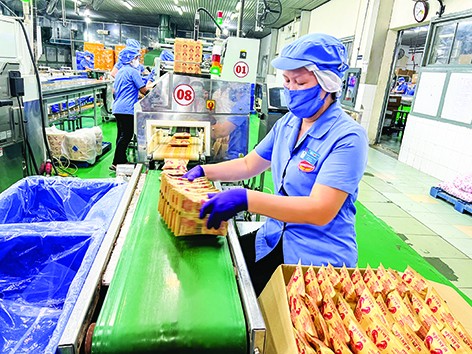
The iconic Miliket brand adapts to stay relevant: U.P (Photo: cafef.vn)
Instant noodles were a favorite among children and those belonging to the 7X and 8X generations. Miliket shrimp noodles were a regular fixture in homes, and the image of the two shrimps huddled together on the yellow cement paper packaging has become an indelible memory for many. However, the reign of the “King of Instant Noodles” faced challenges in the year 2000, with a wave of new domestic and international brands entering the market. Between 2000 and 2003, there were over 50 instant noodle manufacturers in Vietnam, and with their strong resources, these new players continuously promoted their brands through advertising and marketing, causing Miliket to gradually lose its dominant position. There were times when it seemed like people had forgotten about the once-reigning “King of Instant Noodles.”
In the realm of cosmetics, Thorakao was a household name among women in Saigon prior to 1975. The brand name, Thorakao, suggests that using the cream will make one radiant like an angel. During that era, Thorakao stood out for its high quality and affordable prices, coupled with a market that had relatively fewer competitors, allowing the company’s products to quickly gain fame in Saigon.
Recalling Thorakao’s golden era, Mr. Huynh Ky Tran, Chairman of Lan Hao Cosmetics Company Limited (Thorakao), reminisced: “During that period, Thorakao products sold extremely well, and there were times when we couldn’t keep up with the production demand. While other companies used tin boxes or leaf packaging, Thorakao had the most beautiful packaging of that time—a white ceramic jar with a plastic lid.” The products not only had a strong network of distributors but also gained immense popularity in several countries within the region. The company expanded its market reach to China, South Korea, Cambodia, Laos, the United States, Australia, and more.
However, Thorakao’s sole focus on product quality almost led to its downfall. In the early 1990s, when Vietnam officially opened its doors to foreign investment, international cosmetic brands flooded the market. With their financial might, extensive experience, and modern marketing strategies, these foreign brands gradually pushed Thorakao off the shelves.
Adapting to the Times
Mr. Huynh Ky Tran, Chairman of Lan Hao Cosmetics Company Limited (Thorakao), shared that in 2013, a foreign brand offered to buy Thorakao for $30 million, but he turned down the offer. “My family has always been steadfast in our belief that we should preserve our ancestral trade, considering it a valuable asset to pass down to our children rather than selling it for money,” Mr. Tran said.
To sustain and develop the Thorakao brand, the company embarked on a new direction. They focused on utilizing natural ingredients readily available in Vietnam, such as turmeric, soapberries, ginger, lemons, grapefruit, and aloe vera, instead of relying on imported materials. This approach not only ensured that the products suited the physiology of many individuals but also kept the prices competitive. Thorakao maintained its commitment to delivering perfect quality while catering to niche markets, including rural areas, students, workers, and more. They expanded their sales channels and offered home delivery to meet customer needs.
As the world embraced the green living trend, Thorakao recognized an opportunity for a comeback. The company’s current product line predominantly features natural ingredients, aligning with the global shift toward sustainable and eco-friendly choices. Thorakao has been working on launching new product lines that capture the essence of this consumer trend.
“We have received offers to sell or collaborate on our brand with significant financial incentives from foreign corporations, but our leadership team has always refused. Even during the most challenging periods, we have never regretted our decision.
”
– Nguyen Anh Tuan, Deputy General Director of Colusa-Miliket
As Mr. Nguyen Anh Tuan, Deputy General Director of Colusa-Miliket, walked us through their modern noodle production line, he shared that despite the ups and downs, the flavor and quality of the “twin shrimp noodles” have remained consistent, and this has been a key factor in the company’s success. Miliket’s enduring simplicity and resilience have created a unique and memorable brand identity.
According to Mr. Tuan, the over-50-year-old Colusa-Miliket brand has survived by constantly innovating for sustainable development and restructuring to adapt to changing times. “The golden era has passed, and we have weathered the storms. Adversity tests strength, and these challenges have become our motivation to thrive,” emphasized Mr. Tuan.
As a testament to their resilience, Colusa-Miliket has invested in digital transformation, green initiatives, energy management systems, environmental management, and the implementation of new Plasma technology in their production processes, enhancing food safety standards. The “King of Instant Noodles” has consistently maintained its prestigious titles, including the Ho Chi Minh City Golden Brand, National Brand, and Vietnamese High-Quality Goods, as voted by consumers year after year.
Rather than focusing extensively on advertising and marketing through traditional media, Colusa-Miliket frequently participates in Vietnamese High-Quality Goods fairs and the “Vietnamese Goods for Rural Areas” program, distributing their products to wholesale markets, retail shops, and agents. To meet consumer demands, Miliket has expanded its product range beyond instant noodles to include rice-based products like pho, hủ tiếu, bún, miến, and congee, as well as seasoning sauces like chili sauce and broth powder. Through innovation and a unique approach, Miliket has regained its presence from south to north, in supermarkets, eateries, and the kitchens of many families, with its products reaching over 30 countries worldwide.
According to a representative from the Domestic Market Department (Ministry of Industry and Trade), the Vietnamese government has implemented support packages to help revive bygone Vietnamese brands. The “Vietnam National Brand” program aims to raise businesses’ awareness of the importance of branding in enhancing product value and corporate value. Additionally, the “Vietnamese Priority to Using Vietnamese Goods” movement inspires Vietnamese intelligence, pride, responsibility, and aspiration in production, business, and the use of Vietnamese goods.







